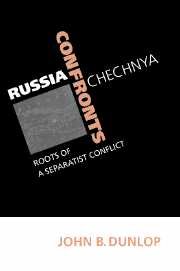4 - Dudaev in power, 1992–1994
Published online by Cambridge University Press: 06 January 2010
Summary
journalist: But in Chechnya there is anarchy.
general dudaev: No more so than in Russia.
The three years which separate the triumph of the Chechen Revolution in late 1991 from the Russian military invasion of Chechnya in December 1994 represented a fast-paced period of convulsive political and social change. Groups in opposition to the Dudaev government began to emerge within Chechnya, especially in its northern lowland regions, and they were aided and abetted, to a growing extent, by the Russian government. Dudaev and his aides showed themselves incapable of running a government, and the Chechen economy, not surprisingly, collapsed. But Russia itself entered a period of intense political turmoil, as the presidency under Yeltsin and the parliament under Ruslan Khasbulatov (who became closely allied with Vice President Rutskoi) moved toward the exceptionally dangerous condition of dvoevlastie (dyarchy), culminating in the bloody events of October 1993.
After Yeltsin succeeded in dissolving the Khasbulatov-led Russian Congress and Supreme Soviet in late 1993, he and his entourage finally became free to direct more concerted attention to separatist tendencies within the Russian Federation. The signing of a power-sharing treaty with previously rejectionist Tatarstan in February 1994 left Chechnya as the sole secessionist holdout in Russia. The Yeltsin leadership began in earnest to seek to destabilize Chechnya and, by one means or another, to remove Dudaev from power.
The economy under Dudaev
As we saw in chapter 3 (pp. 85–88), the economy of Checheno-Ingushetiya had been in decline even before General Dudaev took power in September–October 1991, but it seems clear that Dudaev's policies – or, rather, his lack of policies – served to accelerate that downward movement.
- Type
- Chapter
- Information
- Russia Confronts ChechnyaRoots of a Separatist Conflict, pp. 124 - 163Publisher: Cambridge University PressPrint publication year: 1998



